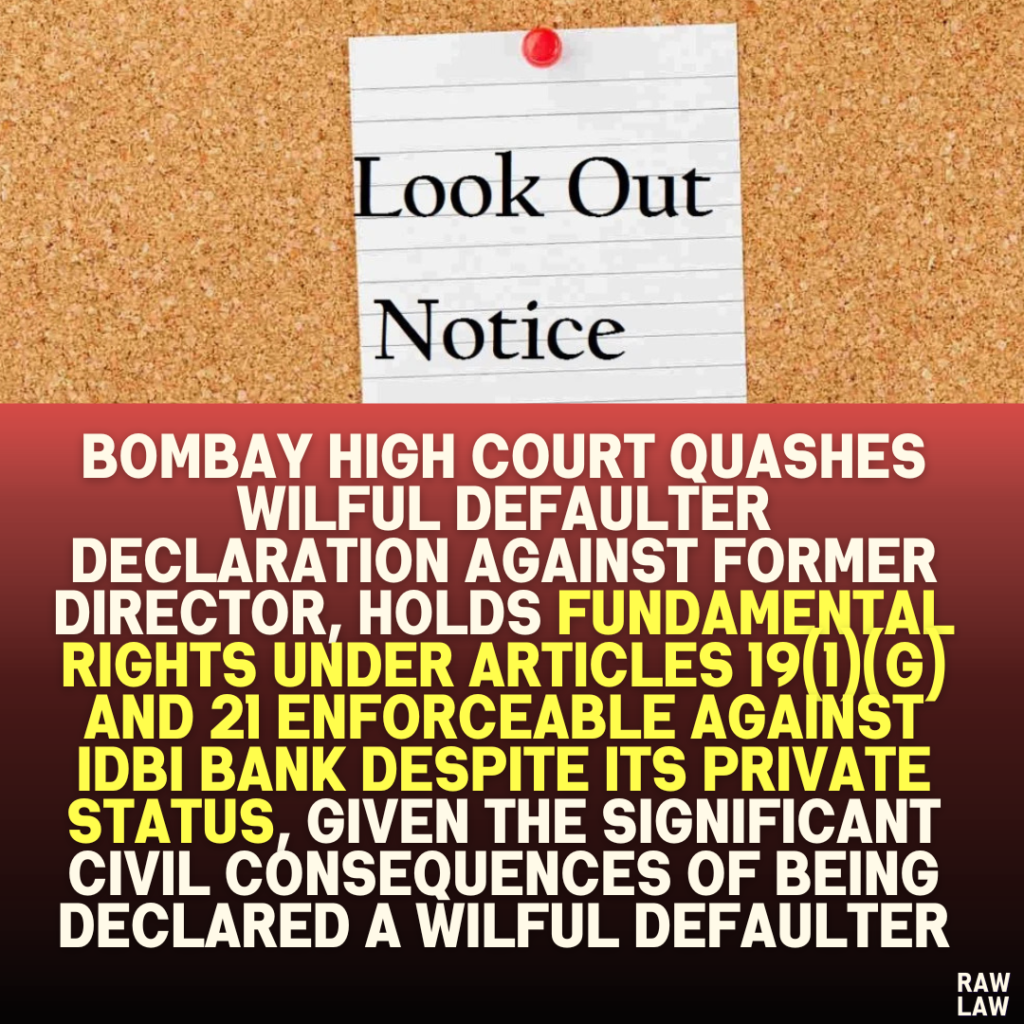The Bombay High Court quashed the orders declaring the petitioner, Ankit Bhuwalka, a “wilful defaulter.” The court held that the proceedings against him suffered from procedural infirmities and violated the principles of natural justice, as critical documents were not provided to the petitioner. The court, however, granted liberty to the bank to issue a fresh show-cause notice in compliance with due process and the principles of natural justice.
Facts of the Case
- Parties Involved:
- Petitioner: Ankit Bhuwalka, erstwhile director of Bhuwalka Steel Industries Limited (BSIL).
- Respondent No. 1: IDBI Bank, through its Wilful Defaulter Committees.
- Respondent No. 2: Union of India.
- Case Background:
- BSIL underwent insolvency proceedings under the Insolvency and Bankruptcy Code (IBC) in 2019, with a new management taking over.
- IDBI Bank issued a show-cause notice (SCN) dated April 5, 2023, declaring the petitioner a wilful defaulter based on a Transaction Audit Report (TAR) prepared by G.D. Apte & Co.
- The petitioner contended that the TAR was based on assumptions and lacked sufficient evidence. He claimed he was not given access to supporting documents to respond effectively.
Issues
- Whether the declaration of the petitioner as a wilful defaulter adhered to the principles of natural justice.
- Whether IDBI Bank complied with the RBI Master Circular on Wilful Defaulters, 2015, in issuing the SCN and subsequent orders.
Petitioner’s Arguments
- The SCN and subsequent orders were based solely on the TAR, which the NCLT had earlier deemed inconclusive.
- The petitioner was denied access to critical documents underlying the TAR, rendering his defense ineffective.
- The proceedings were procedurally flawed, as the petitioner was not provided a meaningful opportunity to be heard.
- Reliance was placed on several judgments, including Jah Developers and Rajesh Agarwal, emphasizing the importance of adhering to natural justice.
Respondent’s Arguments
- IDBI Bank argued that the petitioner had sufficient opportunities to represent himself and respond to the SCN.
- The petitioner was presumed to have access to relevant documents through his previous association with BSIL.
- The TAR provided sufficient evidence for the declaration of wilful default.
Court’s Observations
- Adherence to Natural Justice:
- The court emphasized that denial of access to supporting documents severely impaired the petitioner’s ability to respond effectively.
- A mere extract of the TAR was insufficient for a meaningful defense.
- A personal hearing without access to necessary documents does not meet the standards of natural justice.
- Validity of the TAR:
- The NCLT had previously observed that the TAR was based on assumptions and lacked substantiation.
- The reliance on such a report by IDBI Bank was deemed inappropriate for initiating severe actions like declaring a wilful defaulter.
- Maintainability of Petition:
- Despite IDBI Bank being a private entity, the court held that fundamental rights under Articles 19(1)(g) and 21 of the Constitution could be enforced against it, given the significant civil consequences of being declared a wilful defaulter.
Court’s Rationale
- The court reiterated the serious implications of being declared a wilful defaulter, including restrictions on obtaining institutional finance and reputational harm.
- The RBI’s Master Circular mandates a transparent and fair process, which was not adhered to by IDBI Bank.
- The petitioner’s procedural rights were violated, warranting the quashing of the impugned orders.
Conclusion
- The court quashed:
- The SCN dated April 5, 2023.
- The orders dated September 14, 2023, June 13, 2024, and October 25, 2024, passed by IDBI Bank’s Wilful Defaulter Committees.
- Liberty was granted to IDBI Bank to issue a fresh SCN, provided it complied with due process and the principles of natural justice.
- All consequential actions based on the impugned orders were also quashed.
Judgments Cited
- Jah Developers Pvt. Ltd. v. State Bank of India (2019) – Highlighted the impact of wilful defaulter declarations on Article 19(1)(g) rights.
- Milind Patel v. Union Bank of India (2024 SCC Online Bom 745) – Reiterated the requirement to provide all relevant documents in proceedings.
Implications
The judgment reinforces the need for transparency and procedural fairness in declaring individuals as wilful defaulters. It underscores that severe consequences such as reputational damage and financial restrictions must be preceded by a robust and fair inquiry.




Pingback: Bombay High Court Dismisses Appeal Against Notices Issued Under Section 351 of MMC Act: "Unauthorized Structures Must Prove Their Legitimacy" - Raw Law